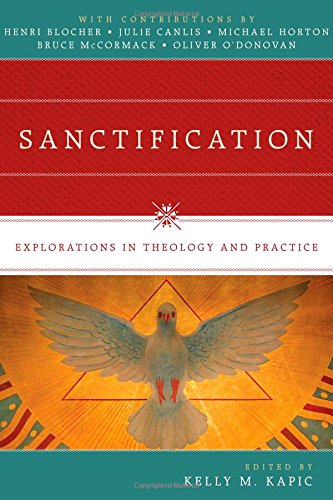We must never lose sight of the fact that while the gospel wonderfully promises justification and acceptance before God, it promises more: it promises transformation also. United to Christ we are accepted and changed, made in his likeness. These are the “twin promises” of the gospel, and somehow it is easy for us to lose sight of one for the other.
In his latest book Kelly M. Kapic (Professor of Theological Studies at Covenant College) focuses on “the younger sibling” in theology, the doctrine of sanctification. He brings together an excellent team of scholars (Derek Tidball, Richard Lints, Henri Blocher, Brannon Ellis, Bruce L. McCormack, Michael Horton, Oliver O’Donovan, James Eglinton, Ivor J. Davidson, Julie Canlis, Peter Moore) to produce an enriching collection of essays, providing a guide that is theologically aware and distinctly pastorally informed. Today he talks to us about his book … and his subject.
Books At a Glance (Fred Zaspel):
Tell us something about the background to this book – how did this team of theologians and collection of essays come about?
Kapic:
 In Scotland there is a gathering that goes back many years now, called the Edinburgh Dogmatics Conference, which is sponsored by Rutherford House. Normally it meets every other year and picks a theme to focus on, and then it recruits biblical scholars and theologians to prepare essays in which they carefully work through a particular theme, offering various reflections from their different training and perspectives. For example, past conference topics have focused on Justification, the Doctrine of God, etc. These scholars normally represent some of the breadth of the Reformed tradition.
In Scotland there is a gathering that goes back many years now, called the Edinburgh Dogmatics Conference, which is sponsored by Rutherford House. Normally it meets every other year and picks a theme to focus on, and then it recruits biblical scholars and theologians to prepare essays in which they carefully work through a particular theme, offering various reflections from their different training and perspectives. For example, past conference topics have focused on Justification, the Doctrine of God, etc. These scholars normally represent some of the breadth of the Reformed tradition.
This book was birthed out of one of these gatherings and I was asked to serve as the editor of the volume. Our topic was Sanctification, and much of what is in this volume was first prepared and presented at that conference in Scotland. Part of what is delightful about this gathering is that the audience there includes a mixture of scholars, pastors, students and other laity. This allows for a rich discussion and debate after each presentation.
Books At a Glance:
Tell us about your broader concerns that gave rise to the book. How has today’s theological climate led you to think a book on sanctification is needed at this time?
Kapic:
As I explain in the “Introduction” of the book, in recent decades debates about justification have dominated the attention of many Protestants. While at times the cool winds of that season can still blow with great power, there are indications that a new season, with new challenges, is at hand. Evangelicals in particular demonstrate strong signs of a growing need to revisit the topic of sanctification. Fresh concern about this vital theological locus is surfacing, which is wonderful since this is where the church so often lives and breathes.
Set free from the dominion of sin, “saints” are set apart for kingdom purposes: as God is holy, so he has called his people holy and promises to renew them in the image of his Son. In a way this is a simple idea. Yet, as becomes apparent in the essays in this book, the topic of sanctification is profoundly intertwined with all manner of other topics, beyond simply its contested relationship to justification. Although justification remains a key idea that can never be left behind, one must also learn to appreciate how sanctification relates to ethics, union with Christ, ecclesiology, adoption, eschatology and so on.
Evangelicalism appears to be in a season of struggling with how best to think about sanctification. What is the relationship between “faith” and human responsibility? How might human agency relate not only to questions of God’s saving grace but also to the way he sustains and preserves us by his grace? Does effort undermine the role of faith? How does all of this relate to our creaturely existence as it is fundamentally empowered by the Spirit? How do we understand the promises of God as we live in the eschatological tension of the now and the not yet?
Books At a Glance:
How has today’s theological climate led you to think a book on sanctification is needed at this time?
Kapic:
At the more popular level we see mistrust and misunderstanding perpetuated. For some, the temptation is to reduce the gospel to moral improvement, while for others, human effort appears irrelevant—if not downright antithetical—to the Christian life.
On the one hand, a number of prominent voices have emphatically focused their message on the “gospel,” by which some tend to mean narrowly “justification by faith alone.” Such voices have at times appeared to provide balm to wounded souls; too many have labored under the suffocating weight of certain forms of rigid fundamentalism that reduced the gospel to a list of oppressive rules. To be told over and over of God’s unflinching love and grace, of your secure position as declared righteous because of Christ’s righteousness, can be both liberating and invigorating to such anguished listeners.
On the other hand, some raise the concern that such a perspective, if left undeveloped, might actually risk perverting grace rather than fully proclaiming it. They worry that if in the process of declaring the “good news” we end up belittling the significance of human will and agency, we are not ultimately liberating people; we might be undermining the fullness of gospel life. Not only is the believer set free from the condemning power of sin, but they are also set free to love and serve others, to grow and to flourish under God’s care. A growing multitude echoes this renewed emphasis on personal piety and holiness and has welcomed renewed exploration of the topic of human agency.
While many of the representative voices on both sides of this come from the Reformed tradition, this conversation is being engaged in by a much larger audience, including many across the spectrum of evangelicalism.
Books At a Glance:
What is the contribution you are hoping to make with your book?
Kapic:
Unfortunately, much of the current conversation is only taking place at the more popular level. In this book, we offer something a bit different. It is not intended as a direct engagement with those particular popular authors, but rather provides some “outside” perspective from theologians who are nevertheless also deeply concerned with the Protestant doctrine of sanctification (and justification!).
No attempt has been made to provide a unified perspective on sanctification in the book—we are not presenting some new school of thought or anything like that, as some of the subtle disagreements even within this volume indicate. Instead, this is an opportunity to explore the doctrine of sanctification; offer various proposals that might stimulate further thought and discussion; and also hopefully encourage pastoral reflection that is biblically, theologically and historically informed. It is our great hope that these essays by ecclesial-minded scholars might stimulate and foster this growing discussion.
Editor’s Note: We will continue our interview with Dr. Kapic here tomorrow. Meanwhile, check out our Summary of Dr. Kapic’s book on Sanctification here.
You may also like to see our previous interview with Dr. Kapic on his A Little Book for New Theologians – Part 1, Part 2, Part 3. This was one of our most popular interviews of 2014!

